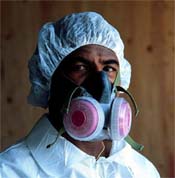 |


|
|
U.S. At Risk of Biological, |
|
By By Cat Lazaroff Environmental News Service
"Terrorism is a clear and present danger to Americans today," Ashcroft told the House Judiciary Committee. "Intelligence information available to the FBI indicates a potential for additional terrorist incidents." "Today I can report to you that our investigation has uncovered several individuals, including individuals who may have links to the hijackers, who fraudulently have obtained, or attempted to obtain, hazardous material transportation licenses," Ashcroft added. Ashcroft told the committee that about 20 people who have been detained since the September 11 terrorist attacks on the World Trade Center and the Pentagon had applied for hazardous materials trucker's licenses. The licenses, which some of those arrested had obtained, would allow them to transport poisonous or explosive chemicals and other types of hazardous materials. So far, they have not been directly linked to the September 11 attacks, but Ashcroft testified that the detainees "may have links" to the 19 men who hijacked four passenger planes and crashed them into the World Trade Center and the Pentagon.
The warning came at the end of a two day ban on flights of crop dusting planes. The Federal Aviation Administration grounded all such aircraft on Sunday on the advice of the Federal Bureau of Investigations (FBI), which warned that the planes could be used to deliver biological or chemical agents. Some of the terrorists involved in the September 11 attacks reportedly spent time learning about the capabilities of crop dusting aircraft. "I urge Americans to notify immediately the FBI of any suspicious circumstances that may come to your attention regarding hazardous materials, crop dusting aircraft or any other possible terrorist threat," Ashcroft said Tuesday. Federal officials have now tightened inspection criteria at U.S. border crossings, and New York City officials have increased the number of random inspections of large trucks entering Manhattan. Still, the United States remains vulnerable to attacks with biological or chemical weapons. Dr. Brundtland of the United Nations World Health Organization (WHO) said Monday that proper surveillance and a quick coordinated response were vital in order to contain any deliberate use of agents such as anthrax or smallpox before they infected large numbers of people. "We must prepare for the possibility that people are deliberately harmed with biological or chemical agents," Brundtland told a meeting of health ministers from the western hemisphere in Washington, DC on Monday. Brundtland said WHO has stepped up its own ability to assist nations in the event of attacks.
 "During the last week we have upgraded our procedures for helping countries respond to suspected incidents of deliberate infection," she told the 43rd Directing Council of the Pan-American Health Organization. "Guidelines for containing the resulting disease outbreaks - whether caused by anthrax, haemorrhagic viruses, other pathogens, biological toxins or noxious chemicals - are available to the medical profession through the WHO website."
"During the last week we have upgraded our procedures for helping countries respond to suspected incidents of deliberate infection," she told the 43rd Directing Council of the Pan-American Health Organization. "Guidelines for containing the resulting disease outbreaks - whether caused by anthrax, haemorrhagic viruses, other pathogens, biological toxins or noxious chemicals - are available to the medical profession through the WHO website."
Any infectious agents or toxic chemical could in theory be engineered for deliberate use as a weapon, according to WHO. Experts in this field believe that smallpox, anthrax, botulism and plague are the pathogens most likely to be used. However, most if not all outbreaks of infectious disease, whether natural or deliberate, would quickly be detected by the "Global Outbreak Alert and Response Network." This overarching network of 72 global and regional networks of laboratories, public health experts and Internet based information systems monitors reports and rumors of disease events around the world. "These networks are linked together as a global system, backed by WHO, with expertise, pre-positioned resources and support from more than 250 laboratories," Bruntland said. "The global network is linked to the International Health Regulations - the legally binding instrument which governs the reporting of epidemic prone diseases and the application of measures to prevent their spread. It also has the capacity to work with countries - investigating dangerous pathogens and confirming case diagnoses." Brundtland said the world had the capacity and the experience to control serious disease outbreaks, but stressed that national capacity and contingency plans, especially in countries where infectious disease outbreaks are rare, should be strengthened. |

© 1997-2002 BEI
 WASHINGTON, DC, (ENS) - Attorney General John Ashcroft warned Tuesday that terrorists operating in the United States may attempt to use trucks to transport chemical or biological weapons to their targets. The warning came as Dr. Gro Harlem Brundtland, Director-General of the World Health Organization, urged nations to strengthen their capacity to cope with the consequences of biological or chemical agents used as weapons.
WASHINGTON, DC, (ENS) - Attorney General John Ashcroft warned Tuesday that terrorists operating in the United States may attempt to use trucks to transport chemical or biological weapons to their targets. The warning came as Dr. Gro Harlem Brundtland, Director-General of the World Health Organization, urged nations to strengthen their capacity to cope with the consequences of biological or chemical agents used as weapons.